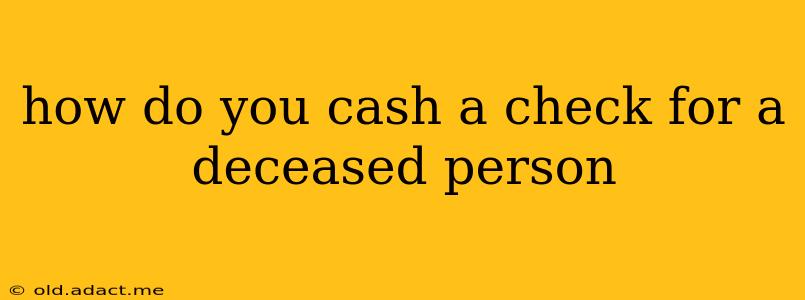How Do You Cash a Check for a Deceased Person?
Cashing a check made out to someone who has passed away requires careful adherence to legal and financial procedures. It's not a simple process, and attempting to cash it improperly can lead to legal trouble. This guide outlines the steps involved and highlights crucial considerations.
Understanding the Legalities: A check is a legally binding document. After someone dies, their assets become part of their estate, and handling their financial affairs requires navigating probate court procedures (in most cases). Simply cashing the check without following proper channels is illegal.
Who Can Cash the Check?
The ability to cash a check made out to a deceased person depends on several factors, including:
- The State's Laws: Laws regarding estate administration vary by state. Some states have more streamlined processes than others.
- The Check's Amount: Smaller amounts might have less stringent requirements than larger sums.
- The Existence of a Will: A will clearly outlines the executor (the person responsible for managing the estate). The executor generally has the authority to cash checks belonging to the deceased.
- Intestacy (No Will): If there's no will, the court appoints an administrator to manage the estate. This administrator will have the authority to cash the check.
How to Properly Cash a Check for a Deceased Person:
The most straightforward and legal method is to involve the executor or administrator of the estate. Here's a step-by-step guide:
-
Locate the Will (if one exists): The will names the executor, who has the legal authority to handle the deceased's financial matters.
-
Contact the Executor or Administrator: The executor/administrator will need to follow the proper legal channels to cash the check. This often involves opening an estate account and depositing the check into that account.
-
Gather Necessary Documentation: This will likely include the death certificate, a copy of the will (if applicable), and identification of the executor/administrator.
-
Work with the Bank: The executor/administrator will need to contact the bank where the check was drawn from and explain the situation. They might need to present the documentation mentioned in step 3. The bank will then guide them on the proper procedures.
-
Potential for Probate Court Involvement: For larger estates or complex situations, the executor/administrator might need court approval to access and manage the funds.
What if the Check is Small and Unclaimed?
For very small checks, it might seem simpler to just ignore them. However, this is not advisable. If the amount is insignificant and there is no executor or administrator readily available, there might be options to claim the funds after a certain period (this timeframe varies based on state laws). It is best to contact the bank where the check was drawn to inquire about unclaimed funds policies.
Can a Family Member Cash the Check Directly?
Generally, no. Unless they are the legally appointed executor or administrator, cashing the check directly would be considered illegal. Attempting to do so could result in serious legal consequences.
What if the Check is Payable to the Deceased and Another Person?
If the check is payable jointly (e.g., "Payable to John Doe and Jane Smith," and John Doe is deceased), the surviving payee (Jane Smith) can usually cash the check with proper identification.
What Happens if the Check is Lost or Destroyed?
If the check is lost or destroyed, a replacement check might be possible. Contacting the issuing entity is crucial in this situation. The executor or administrator will need to handle this process, proving the legitimacy of the request.
This information is for general guidance only and does not constitute legal advice. Consult with a legal professional or estate attorney for advice tailored to your specific situation and jurisdiction. Navigating the complexities of estate administration is best done with professional guidance to ensure compliance with all applicable laws and regulations.
